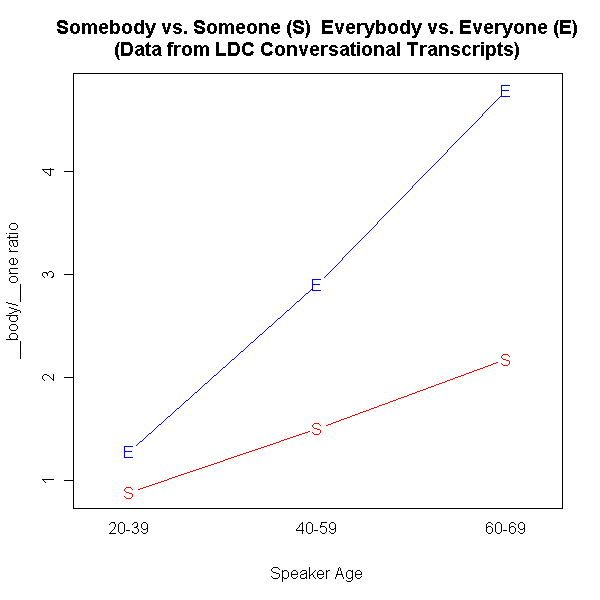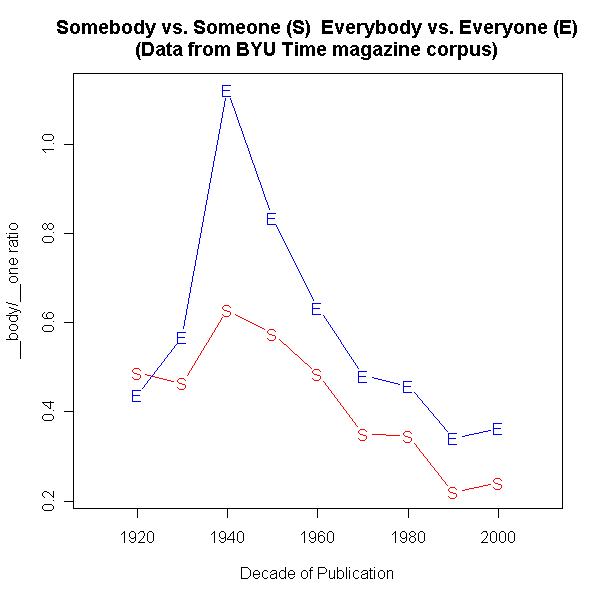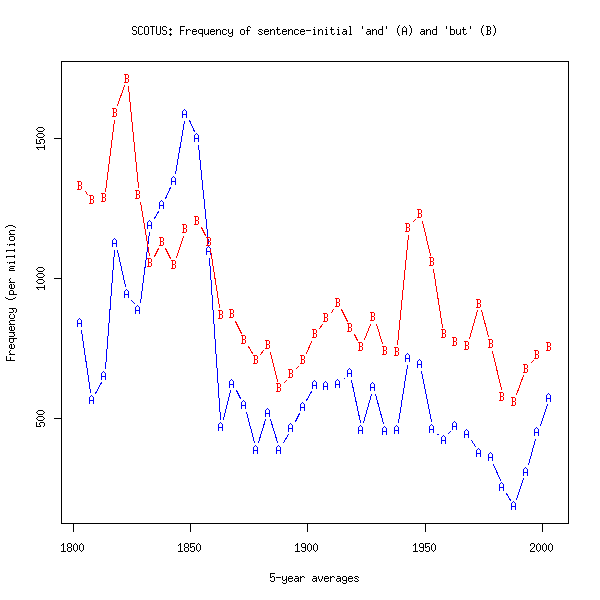Body loses Supreme Court appeal
« previous post | next post »
This morning, I appealed the somebody-vs.-someone story to the Supreme Court of the United States. The decision came quickly — details are below.
A few days ago ("Less body in your lexicon?", 11/11/2009), I gave evidence confirming that someone and everyone are more formal than somebody and everybody (because the __body / __ one ratio is an order of magnitude larger in speech than in academic writing). But I also offered evidence that the __one forms are taking over from the __body forms, in all registers of English.
Some of this evidence came from apparent-time differences in conversational transcripts, where it seems that the younger people are, the more likely they are to choose __one forms:
And some of the evidence came from historical-time counts, for example in the BYU Time Magazine corpus:
(Note that the x-axis numbers are the first years of decade-long bins — thus the value plotted at 1940 is the value for texts published between 1940 and 1949.)
Thanks to Jerry Goldman of oyez.org and Tim Stanley of justia.com, I've got a nearly-complete archive of U.S. Supreme Court opinions in html form, and I extracted the year-by-year lexical histograms for an earlier Breakfast Experiment in which I tracked the trends in SCOTUS use of sentence-initial conjunctions:
So it was just a couple of minutes' work to check on the evolution of the __body / __one ratio.
The year-by-year ratios are quite noisy, since all of the relevant words are relatively rare in these texts, so I averaged by decade. The results since 1866 look like this:
This picture is different in various ways from the Time Magazine data. The Time -body peak seems to be in the 1940-1950 decade, while the SCOTUS peak seems to be in 1916-1925. And compared to Time, SCOTUS has anomalously-low values for the somebody/something ratio in the 1926-1935 and 1936-1945 decades.
Supreme Court opinions are not an ideal source of evidence for analyzing this phenomenon, because the number of authors is small and erratically variable, and (as in formal writing in general) the counts for these particular words are low overall. So in this case, the court's opinion may not have very wide application. Still, the SCOTUS data is consistent with a general decline, over the past few decades, in the frequency of somebody and everybody relative to someone and everyone.
Thus I'm provisionally convinced that in this case, the culture as a whole (or at least its American portion) is trending fairly strongly towards the more formal member of two related pairs of words that are roughly equivalent in meaning.
I can't think of another documented example of a case where the language as a whole is trending away from the vernacular rather than towards it — can you?
Here are the raw SCOTUS counts in tabular form:
| Years | Total words | Somebody | Someone | Everybody | Everyone |
| 1866-1875 | 4,681,448 | 12 | 77 | 7 | 66 |
| 1876-1885 | 6,332,333 | 12 | 41 | 23 | 64 |
| 1886-1895 | 10,070,882 | 26 | 75 | 27 | 97 |
| 1896-1905 | 8,605,007 | 13 | 60 | 40 | 93 |
| 1906-1915 | 6,454,454 | 14 | 56 | 15 | 47 |
| 1916-1925 | 4,758,703 | 12 | 16 | 16 | 22 |
| 1926-1935 | 4,504,824 | 8 | 29 | 8 | 17 |
| 1936-1945 | 5,552,858 | 8 | 61 | 20 | 33 |
| 1946-1955 | 5,101,032 | 18 | 56 | 35 | 61 |
| 1956-1965 | 6,216,798 | 40 | 128 | 25 | 79 |
| 1966-1975 | 8,774,322 | 36 | 201 | 20 | 101 |
| 1976-1885 | 13,106,854 | 36 | 312 | 28 | 125 |
| 1986-1995 | 10,298,169 | 36 | 350 | 14 | 97 |
| 1996-2005 | 7,731,353 | 15 | 344 | 18 | 122 |
You should take these numbers with a grain or two of salt, since the process of extracting text from html can be messy, and I didn't spend much time dealing with the peculiarities of this particular set of pages.




Dan Lufkin said,
November 13, 2009 @ 11:19 am
Maybe trying to cut down character count foreshadowing Twitter.
Benjamin Zimmer said,
November 13, 2009 @ 11:31 am
I can't think of another documented example of a case where the language as a whole is trending away from the vernacular rather than towards it — can you?
Going back a few centuries, one could argue that something like that happened with the death of thou/thee and the rise of you as the singular second-person pronoun.
Daniel Ezra Johnson said,
November 13, 2009 @ 11:46 am
Ben, you took my example, and it says you did so at 11:31 when it's still only 10:39, too.
[(myl) For some reason, our server didn't "fall back" with everyone else for the daylight-savings-time shift. I've adjusted the time manually for now…]
But I'll still mention the work by Haddican, Richards, and Taylor on "The past and present of body/one variation". Finding the same shift towards _-one_ over the centuries in historical documents (e.g. letters) as well as in contemporary oral corpora, they "speculate that [it] is related to the loss of _body_ as an independent indefinite pronoun and the [limited? DEJ] perseverence of _one_ in this guise.
[(myl) Thanks for this reference, which I should have been diligent enough to find for myself.]
Good night, my some-corpus one « The Coming of the Toads said,
November 13, 2009 @ 1:44 pm
[…] | Tags: Grammar, Language Log, Meredith Willson We’ve been enjoying a discussion over at Language Log on the difference between the words someone and […]
Jerry Friedman said,
November 13, 2009 @ 2:26 pm
Not documented, but if I were looking for some, I'd try albeit versus though and although, and had I versus if I had, etc. Speaking of those forms and having used if I were above, I've heard that the subjunctive is making a comeback in Britain—both if I were and it's essential that he do it. (Maybe I'm showing my ignorance by calling those subjunctives.)
David Eddyshaw said,
November 13, 2009 @ 7:48 pm
The old form
'twas
for 'it was' has been replaced by the uncontracted form; similarly with
on't
and quite a number of others
DaveK said,
November 13, 2009 @ 8:13 pm
I can't think of another documented example of a case where the language as a whole is trending away from the vernacular rather than towards it — can you?
There are the grammatical hypercorrections such as "between you and I" which result from a vague feeling that "me" is a vulgarity–but I hope they don't represent a trend.
Ben Bolker said,
November 13, 2009 @ 8:26 pm
@DaveK, ditto (I think?) for "… xx and me" to "… xx and myself", which seems not wrong but unnecessary (and driven by the same sort of concern) to me (?)
Adrian said,
November 13, 2009 @ 9:25 pm
"I can't think of another documented example of a case where the language as a whole is trending away from the vernacular rather than towards it — can you?"
I'd put the trend towards spelling pronunciation in that category.
[(myl) Hypercorrections and spelling pronunciations are certainly cases where the language moves away from the vernacular, but in both cases, it's moving towards a false image of a more formal register, rather than towards the formal register as it really is. ]
uberVU - social comments said,
November 13, 2009 @ 11:30 pm
Social comments and analytics for this post…
This post was mentioned on Twitter by interests: Language Log: Body loses Supreme Court appeal http://bit.ly/1Ukzle…
Andrew said,
November 14, 2009 @ 1:38 am
Perhaps a century or so ago, prestigious Americans used participles and gerunds ending in -in' rather than -ing (runnin'/running). Nowadays, the reverse is true: -in' is informal, and -ing is more formal.
[(myl) As I understand the history in England, the participial ending in /ɪŋ/ was a middle-class innovation, with those both above and below retaining the historical /ɪn/. Then the upper classes abandoned ship, leaving "g-dropping" as a lower-class phenomenon, though variably present to some degree in most speakers at all SES levels. See this post for some further discussion. I've never heard that upper-class Americans preferentially retained the historical pattern — do you have a citation?]
Graeme said,
November 14, 2009 @ 1:40 am
Can anyone/body comment on the dramatically higher absolute usages in recent decades compared to say the 19th century?
Is there some synonym that has dropped put of usage?
[(myl) Dramatically higher absolute usages of what? The best evidence I have about rates of {somebody, something} is from the Time Magazine corpus, which is admittedly an imperfect source, but shows an 4.5-to-1 increase since the 20s (numbers are frequency per million):
Similarly a 2.4-to-1 increase for {everybody+everyone}

and a 3.2-to-1 increase for {anybody+anyone}

Adding up all three
we have a 3.1-to-1 increase in overall frequency. This might just represent the evolution of Time Magazine style, but I suspect this is not the whole story.
]
Geoff Nunberg said,
November 14, 2009 @ 2:54 am
Speaking of "Goodnight, my someone," which as The Coming of the Toads notes is a whole lot better than "Goodnight my somebody," Dwight Bolinger suggested in Meaning and Form (which I could have sworn I had a copy of somewhere) that the difference between someone and somebody is that the forms in –one are marked for closeness to the speaker and individuation, and thus preserve some part of the sense of one, while the –body forms are unmarked along this dimension. Bolinger's example, if memory serves, was along the lines of:
A. Who's the gift for?
B: Someone/somebody
where someone, he argued, is more apt when the speaker has the addressee in mind. Maybe it would be possible to test this against the corpora. For example "someone special" seems to be between 8 and 10 times more common than "somebody special" on Google while "someone or other" and "somebody or other" run more-or-less neck and neck, which if the base frequency of someone is generally higher would give the edge to somebody in the latter case. (This on the basis of searches combining the terms with pairs like "cleveland crispy," "hilton reply" and "mccain golfers" so as to get the results down under 1000 where Google counts can be trusted.) I suppose this effect could itself be a pragmatic consequence of the basic difference in register, though I'm not sure exactly how the argument for this would go or how you would test it.
David Cantor said,
November 14, 2009 @ 7:01 am
Just for fun, I asked my wife what the difference was in her use of English between Someone and Somebody. For her, Someone is used when referring to a specific and defined group "Someone in this room committed the murder," while Somebody fit better with an undefined group: "Somebody left a mitten on the sidewalk."
Not sure that I distinguish these in that way, but I thought it was interesting
marie-lucie said,
November 14, 2009 @ 8:49 am
I am not a native speaker, but after 45 or so years living in NA English, I agree with Geoff Nunberg and with David Dantor's wife. It is not a hard and fast rule, but it seems fairly general. I would add that a heavily stressed "somebody" rather than "someone" can be used in order to pointedly avoid referring to a person by name, as in "Somebody left their socks on the floor", said to the person who did that very thing, without appearing to assign blame.
Jerry Friedman said,
November 14, 2009 @ 12:56 pm
Or without appearing to appear to assign blame. And it doesn't have to be blaming. One I remember was many years ago, when my brother showed me something he had written, and my comment was, "Somebody's been reading Tom Robbins." (My brother was quite pleased.) Naturally, I heard a similar sentence yesterday, but I can't remember it now.
I always use "somebody" in the sense of "we both know very well who", but one time when I mentioned that on alt.usage.english., someone said he would always use "someone".
Google Books results:
200 (really 142) for "somebody in this room" date:1999-2009
600 (really 420) for "someone in this room" date:1999-2009
208,526 for someone date:1999-2009
102,600 for someone date:1999-2009
So "someone" is indeed more common than "somebody" in this sense—in the deeply flawed Google Books "corpus".
Graeme said,
November 14, 2009 @ 7:50 pm
Thanks Mark; yes I meant that, according to teh SCOTUS data, 'some/…..' had become much more common, yet seemingly not at the expense of starving 'every/….' of appearances. Your Times data seems to confirm and extend this to 'any/….'
Perhaps some of this change in style has been accelerated by a preference for ungendered terms. What synonyms have fallen into relative disuse; or, more fascinatingly, has there been a conceptual shift? Eg, do we think/write in a more abstracted manner? Could these terms be better fitted to the more alienated, mass social relations felt since the second half of the 20th century?
(This is a long bow: I stumbled across the use of the word 'souls' instead of 'people' or 'electors' in a late 19th century constitution dealing with electoral matters, and am still trying to trace the use of that rather religious term in otherwise administrative regulation contexts).
Army1987 said,
November 15, 2009 @ 9:18 am
Re "I can't think of another documented example of a case where the language as a whole is trending away from the vernacular rather than towards it — can you?":
Not in English, but in Italian I've seen some old poems with words such as "mo'" or "fratte" with footnotes "translating" them as "adesso" and "arbusti" (meaning "now" and "bushes"). That surprised me as the former are still somewhat more common in informal speech, at least in central and southern Italy (though I would never write them in any text more formal than an IM chat). (Of course Italian is a special case, as about half of the Italian population could only speak the local vernaculars — often not mutually intelligible with Italian or with each other — as late as in the 1950s.)
Portia said,
November 15, 2009 @ 12:25 pm
I'm young (21) and some-/everyone appear hundreds of times in my Gmail log, and some-/everybody only about 20 each.
Daniel Cavanagh said,
November 15, 2009 @ 11:52 pm
dan lufkin, that's a good idea about twitter, or rather sms in general. every1 vs. everybody? i suspect sms has been around long enough for that to have had an effect, at least amongst the young
also, 'everyone' is phonetically shorter and (arguably) easier, which is always important
Kenny Easwaran said,
November 18, 2009 @ 5:13 am
I wonder if you'd find more examples of this sort of phenomenon with words connected to science or technology – originally there is some vernacular word for the thing, but as people become more familiar with the technology or science, the technical word catches on. Unfortunately, I can't think of any good examples to test the theory out on.
At any rate, it also strikes me as being reminiscent of the Flynn Effect – people do better on IQ tests over time because society has developed in ways that are more congenial for the sorts of abstract thinking that are used in IQ tests. Perhaps greater professionalization and education has led to a few similar changes elsewhere, even though in most cases the rise of vernacular terms outraces the rise in IQs/education levels/whatever.